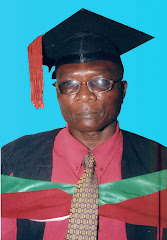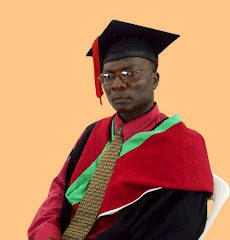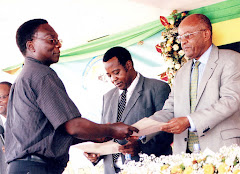Monday, September 28, 2015
Bisimba: Government contributes more to violation of human rights
An activist has described the high rate of violation against human rights in the country is growing at an alarming rate, and condemned the government main security organs to be contributing a lot by 60 percent, it has been learnt. The Executive Director of Legal Human Rights Centre (LHRC) Dr. Helen Kijo-Bisimba made a concern on Saturday last week in Dar es Salaam at the occasion to mark the 20th Anniversary celebrations of the Centre which was graced by various human right groups working in the country. The occasion went alongside with the launching of a 486 paged book titled, “The struggle of Human rights in Tanzania” that describes the history and the main activities the centre has been contending with since its establishment in 1995. In her speech, Dr. Bisimba noted that, security organs in the country have the tendency of hiding the truth about most serious matters which have been exposed that reveals involvement of some imminent government officials in particular financial scandals in the country. She mentioned the issue of grand corruption and noted that, whenever such malpractices have been exposed to the general public, no any action has been taken against the perpetrators. Citing an example of the biggest financial scandals ever happened in the country in recent years such as the EPA, Richmond, purchase of radar, and Escrow issue and noted that, all these have denied the rights of tax payers in the country.
The Executive Director of Legal Human Rights Centre (LHRC) Dr. Helen Kijo-Bisimba
Elaborating more with specific examples taking Escrow issue as a case study, she said that the development partners ceased the release of fund to run the development projects in the country. “This is such a vivid example and a surprise that shows that security organs are not working for the people to endure good governance in the country”, she said adding that it was amusing to see that no any leader has been held accountable out of all these malpractices. “This is a violation of human rights as people are denied their basic rights which have been taken by few into their pockets a result of which there is no money with which to give special attention to the people who remains stranded without any services rendered to them”, she asserted. However, she went further and described other acts as related to some serious mischief notably the abduction of people who spearhead the rights of the people in the country such as the former Chairman of the Medical Association Steven ulimboka is contrary to the human right situation. She noted that, the action had tarnished a good name of a country overseas and other acts such as that of journalists Saed Kubenea and Absalom kibanda. He also associated acts such as the killings of a television journalist David Mwangosi and the suspension of newspapers in the country as all associated with violation of human rights. She elaborated in broader perspective and noted that, human rights violation is generalized as the denial of legal rights entitled to a person that also includes basic services such as health education and many others in communities. Coming to the real meaning, she said that whenever all these services are not provided on time as required, the government has to give explanations and failure to that is accounted to perform in satisfaction.
Election campaigners asked to tout for budget transparency
Discussants over the recently released report of new
global budget survey 2015 whose findings indicates that Tanzania ranks the
least among the East African countries from being transparent in the provision
of budget information to the public, have called on the coming fifth government
to address the issue in openness. The survey report which had been released by a
local non-profit civil society organization-HakiElimu Tanzania was tabled for
discussion yesterday in Dar es Salaam at a breakfast talk organized by Policy
Forum which was conducted under the theme titled, “Will the next government prioritize budget transparency”. The
report presented by Manager for Research and Policy Analysis. Boniventura
Godfrey says that Tanzania is ranked the least after having scored the third position
among the EAC countries because it has failed to put in openness national
budget information to its citizens. According to statistics given in the report
for all 120 countries in the world, among the East African countries, Uganda
was ranked the leading with 62 per cent, followed by Kenya with 48 per cent, Tanzania
with 46 percent and Rwanda obtained 36 per cent. In the budget preparation
process, Tanzania only scored 33 per cent on the opportunities the government
provides for the public participation in budget making process, while during
the preparation of Controller Accounts General (CAG) report is 50 percent. Contributing their views over the matter discussants
have strongly called on the coming fifth phase government to address the issue,
and at the same have asked politicians to weigh up their views over the matter
at this time when campaigns for general election is going on. A retired
Professor Adolf Mascarenhas of the University of Dar es Salaam (UDSM) said that
important matters that deal directly with government budgets must be given
priority and put in openness as they might help reveal issues related with
corruption malpractices in the country.
Manager for Research and Policy Analysis of a local non-profit civil society organization-HakiElimu in Tanzania Mr. Boniventura
Godfrey
However, he has called on politicians and Tanzanians in
general to wake up and challenge senior executives who keeps on talking about
water, electricity, education and have forgotten to think about sensitive
sectors that brings money to develop such necessities. Shabani Mwangondo, a
representative of youth desk from UNESCO offices queried the rationale of the
government of keeping quite with public information which it is supposed to
relay to people in rural areas, calling on the education to be given to the government
executives on the importance of such information to the people in the country. James
Obeid, a human right activist said that denial of information has led to
mistrust among the executives in government sector, an aspect that exacerbates
corruption malpractices as people are not fed up enough with the information
about their own resources such as gas and minerals. In view of this, he has
called on the government to make use of ministerial websites whereby it could disseminate
such information to the general public wherever necessary. Datus Pastory from
Royal college of Tanzania wonders with the surging government’s budget which
has pegged up to Sh. 22 trillion, and the most disappointing thing he has noted
is that, with this budget about 83 percent is directed to recurrent expenditure
whose information is not open and clear. However, he has castigated the
government for not being transparent with tax payer’s money which always is a
cause of mutual understanding even in parliamentary proceedings. James Obeid
wonders why policemen have turned to become judges on the road sanctioning
fines to defaulting drivers on the road, however, he is in doubt if the money
collected is taken to the government coffers. He is of the view of the fact
that all should be made open and people must be shown a report of the money
collected and because of lack of such information the public loses trust with
the government. Joshua Mwambande from Human Rights Commission in the country,
has suggested that there should be formed a taskforce to monitor budget
allocation to verify correct transactions entered into account. He is of the
view of the fact that, the taskforce must be empowered by the law so that once
it is in operation and discovers any discrepancy somewhere should report the
matter to the concerned authorities. In this way however, the situation could
bring public trust.
Ministry directs Mbarali DCD to inform an investor to return land
In what seems to be
a move under the operation to reduce escalating land disputes in the country, the
Director of Mbarali District Council (DCD) in Mbeya region Adam Mgoyi has
received a letter from the Ministry of Lands, Housing and Human Settlements
Development that requires him to inform an investor who had acquired land
formerly owned by local people in the district to surrender it immediately, the
Citizen has reliably learnt. The Director Mgoyi said yesterday that, a letter which
has been written by the Commissioner of Land from the ministry headquarter, has
directed him to ensure that an investor surrenders a land portion of between
1,870 and 7,370 hectares which he had acquired to develop paddy fields in Kapunga
Rice project. “On Wednesday this week I received a letter that orders the
investor to return a land title deed which had guaranteed him legal ownership
of the 1,870 hectares of land which the government has now revoked his
ownership and directed to be owned by the local people”, Mgoyi said.
Minister for Lands, Housing and Human Settlements
Development Mr. William Lukuvi
He noted
that, the area which had been acquired by the investor is among the many hectares
of land currently in dispute with neighbors and people living around the area. People
in the area have been insisting that, the government through the National
Agricultural and Food Corporation (NAFCO) had given to the investor a vast portion of land which
currently is in dispute when it was seeking for the land in the area for
investments purposes. Mgoyi clarified that, the government’s action which it
has taken of issuing a letter that requires the investor to return the land to
the local people, will be a permanent solution to the long standoff of the land
ownership in the district which has caused a mutual of misunderstanding among
users. Contacted for comments, the Commissioner of Land from the ministry Dr.
Moses Kusilika admitted to have been some changes the ministry has made
including to order the return of portion of land the investor had taken for
development and relocated to the local people in the area. He said in a
telephone interview that under the process, the ministry had withdrawn a land title
deed which the investor had presented to the bank for the sake of getting loan
for development and agreed with the bank after long consultations to verify
that an investor had a certain portion snatched from the hectares he earlier took
so that in his title deed should be accepted with the remaining hectares after
an evaluation was completely done according to the law.
An education expert says free education in Tanzania is possible
Two days after some education stakeholders
castigated the idea of having free education in the country as being
perpetrated by some politicians in their campaigns, an educationist has said
that the concept is possible if the government would strictly put in place proper
use of taxes and other revenues collected. According to the expert, there are
various ways in which the government could follow in order to accumulate funds
from own local resources that can be enough to subsidize the widened gaps existing
in education sector. Speaking exclusively in Dar es Salaam yesterday, the
Secretary General of Tanzania Teachers’ Union (TTU) Ezekiah Oluoch said in a
telephone interview that the government has enough resources to enable it fully
fund basic education from early primary to form four secondary school up to
diploma levels for teachers training in vocational colleges. Oluoch who
professionally is a teacher noted that, “the only problem lies on the mismanagement
of government funds and that no any leader in the country who has valued
education and take a keen interest to help the nation in this matter, instead
have been touting for the idea without demonstrating their action plan”. Elaborating
on major steps that the government should follow in order to succeed, he quoted
the recent World Bank report which says that developing countries need to
invest not less than 5 percent of their Gross Domestic Products (DGP) in basic
education, but this is contrary to 1.4 percent which Tanzania has invested. He
said if the government would increase the percentage rate of its GDP in
education and reach up to 5 percent, it means that students in public schools
could not be required to contribute anything as is the case now whereby parents
are forced to meet about 95 percent of the operational costs needed to be
incurred by schools. However, he noted that, what could be required for
students to incur is their school uniforms, shoes, beddings for those in
boarding schools and other things for their personal necessities. He said Tanzania is lagging behind from other East
African countries that have increased their GDP rates in education and outlined
their statistics as indicated in brackets as Kenya (7.8 percent), Uganda (4.8
percent), Rwanda (5.8 percent) and Burundi (2.2 percent). In higher learning education,
he noted that if the government through Higher Education Students' Loans Board
(HESLB) could increase a deficit of 50 percent from the amount it currently
give as loan to students which stand at Sh. 400,000/- per year, and this is
increased up to Sh. 600,000/- it could have been enough to all students who are
in need of such loans.
The Secretary General of Tanzania Teachers’ Union (TTU) Ezekiah Oluoch
Coming down on how the money should be collected, Oluoch
has outlined various channels through which the government can make it possible
for the benefit of the people especially the poor to enjoy. He noted that, the government should slash down tax
exemption which at the moment has amounted to Sh. 1 trillion and save the money
that should be directed to education sector. He queried a reflection how world
wonders why Tanzania which economically is not stronger enough and that has
introduced a system of tax exemptions in its government tax collection scheme. Apart from that, he has blasted the
government for failure to curb the increased rate of corruption and other
various financial scandals such as Escrow which have emerged in recent years
and no any effective control has been put in place. He has outlined ways on how
the government can make proper use of Skills Development Levy (SDL) which every
private employer in the country contributes 5 percent of their wage bill for
the development of vocational trainings mostly in VETA colleges. According to
him, only little percentage rate is taken there and larger amount is directed
to public higher learning institution an aspect which he said is contrary to
the purpose for which the fund was established. He said if the whole lot could
be taken to VETA schools, students could be getting free education. On property
tax he said that, if every house constructed in both surveyed and unsurvey
plots could be charged correctly in the country, this is also another source of
money that could be directed to fund education in the country. He further
suggested that the government should have directed road tax collected for fuel
so that it could contribute for education. Another amusing thing is where he queried
why should the government continue collecting Pay As you Earn (PAYE) from
servants whose salary are less than 5 million per year whereas it gives a tax
free holiday to business people whose profits is less than 20 million per year.
He said if a tax structure could be harmonized properly, he is optimistic that
Tanzanians could be freely taking their basic education if such schemes could
be stiffened into action. “Free education is possible and is just a matter of
sitting down and decide on the best ways to be followed”, he said and added
that only that national leaders take the issue for granted and politicizing it
for no reasons. Last week, the Interim Chairman of the Coalition of Defenders
of People’s Constitution (UKAWA) James Mbatia outlined measures which the group
will take in its move to provide free education as earlier campaigned by
Chadema Presidential Candidate who represent the group Mr. Edward Lowassa. He
said the coalition’s plan included slashing presidential foreign trips to 80
percent and other measures he noted would involve curbing tax evasion and
improving efficiency at the country’s major harbours. Mbatia who doubles as
NCCR-Mageuzi Chairman assured that the money was enough to build at least 200
vocational training colleges at the cost of SH. 20 million each. The ruling Chama Cha Mapinduzi (CCM) has
always been assuring Tanzanians in the on-going campaigns that it would allow
free education from the Primary level up to Secondary level in order to let
everybody in the country attain basic education.
Government seeks for SA technical experts to demolish a building
THE Government has floated its tender in South
Africa seeking for technical engineering experts with high Calibri to demolish a
16 storey building which has been earmarked for demolition along Indira Gandhi Street
at the centre of Dar es Salaam city. The Minister for Lands, Housing and Human
Settlements Development, William Lukuvi said that despite efforts made by his
ministry of getting an expert who could apply a safe technology of pulling down
such a high rise building from the country and within East Africa region has
failed, the government has seen the need to look for such engineering expertise
from South Africa. The Minister was briefing journalists on various development
steps his ministry has taken so far in a move currently being undertaken to
curb the escalating land problems which is being exacerbated by few unfaithful
citizens in some regions in the country. Under the operation, his ministry
through a taskforce formed consisting of land and building experts has noted
that about 48 buildings which have been noticed to have been constructed in
wrong plots in some suburbs in Dar es Salaam region have been ordered to be
demolished immediately. He said the government has already set aside the sum of
Sh. 1 billion for the demolition work of a 16 storey building in case it would
get a strategic engineering company which will win the tender to do the job
which the government had announced since the beginning of this financial year
2015/16. The building which was ordered by the government to be pulled down is
owned by a Dar es Salaam based business man Raza Huseein Damji with the
National Housing Corporation (NHC) having a 25 percent share in the
project. The government through the
ministry of Lands, ordered the building be pulled down after building experts
discovered that it had developed some internal cracks on its walls whose
presence poses a great threat to the lives of the people around it.
The
Ministry had ordered the demolition after the former building owned by the same
businessman that stood opposite it collapsed in March 2013 and killed about 36
people at a time when Prof Anna Tibaijuka was the Minister in-charge of the
ministry. Preliminary investigations had
established that, the two buildings with different construction permits had
violated the laid down contractual rules and regulations as stipulated in their
contracts whereby the owner erected a 16-storey structure instead of 10 floors
as stipulated in the building permits which had been issued by Ilala Municipal
Council authorities in Dar es Salaam region.
The mistake was discovered when the former building collapsed and during
the investigations that lasted for a couple of one month later, building
experts had discovered that the present building had been constructed at fault
and recommended immediate demolition to prevent further losses. The survey
carried by the Citizen yesterday around the area noticed there is no sign post
to indicate any danger around as required by the law so as to alert passersby
in a bid to take precautions of any possible impending danger that might occur
at such unlikely time of a day. Contrary to these alerts, the Citizen has
discovered that business is going on as usual in the area as though the site is
safer to the understanding of many people who do not know the rule and instead
keep on cross passing near to the building to attend their various business
missions in the city, while others park their cars close. However, a member of
Tanzania Contractors’ Association Board who preferred anonymity said that, such
sites which have been condemned under such dangerous situation depends on the
structural integrity of a building, but is not necessary that it should be
restricted from any social activities around near to it.
Subscribe to:
Posts (Atom)














